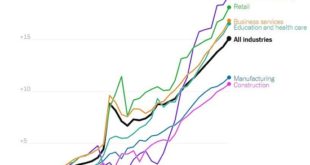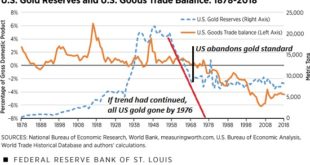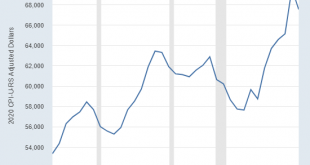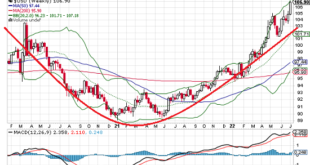If “markets” controlled by the rich are allowed to distribute essentials, the result will be civil disorder and the overthrow of regimes. What’s worse than inflation? Depression + Inflation. And that’s where we’re heading. As I explained yesterday in The Fed Can’t Stop Supply-Side Inflation, central banks are trying to reduce inflation by crushing demand. This works in eras of abundance, but not in eras of scarcity in which supply constraints drive inflation. If the...
Read More »The Fed Can’t Stop Supply-Side Inflation
The Fed and other central banks have zero control of supply-driven inflation, period. America’s financial punditry is bewitched by four fatal fantasies: 1. Inflation is demand-driven. If the Federal Reserve (or other central banks) reduce demand with monetary tools like raising interest rates, inflation will cool. 2. Substitution of high-cost goods with lower-cost goods reduces inflation, and substitution is infinite: there’s always cheaper chicken if beef gets too...
Read More »The Real Story of America Abandoning the Gold Standard
Even currencies maintaining convertibility to gold are still subject to bond yields, interest rates, trade and capital flows. It’s widely held that all of our financial woes are the result of abandoning the discipline of the gold standard in 1971. The premise here is that if the U.S. had maintained the gold standard, the excesses of the fiat currencies regime could not have arisen. The real story is the U.S. was hemorrhaging gold in the 1960s at such a rate that...
Read More »A Tale of Two Recessions: One Excellent, One Tumultuous
Events may show that there are no winners, only survivors and those who failed to adapt. Some recessions are brief, necessary cleansings in which extremes of leverage and speculation are unwound via painful defaults, reductions of risk and bear markets. Some are reactions to exogenous shocks such as war or pandemic. The uncertainty triggers a mass reduction of risk which recedes once the worst is known and priced in. Far less frequently, structural recessions are...
Read More »A Most Peculiar Recession
So what are conventional pundits missing today? I would start with three dynamics. Only old people experienced real recessions–those in 1973-74 and 1980-82. Recessions since then have been shorter and less systemic. In the good old days, a recession laid waste to entire industries which never recovered their previous employment. People who were laid off couldn’t find another job. Major sectors of the economy dried up and blew away. Jobs were scarce and there was an...
Read More »Are Older Workers Propping Up the U.S. Economy?
Are 55 and older workers propping up the U.S. economy? The data is rather persuasive that the answer is yes. The chart of U.S. employment ages 25 to 54 years of age and 55 and older reveals a startling change. There are now 20 million more 55+ employed than there were in 2000, an equivalent of the entire workforce of Spain. This unprecedented demographic / employment transition is worth a closer look. As the second chart shows, some of this increase is due to the...
Read More »Can We “Export Inflation?” Yes We Can, Yes We Are
A strong currency exports inflation to those nations which do not issue the currency. Though it’s difficult to be confident of anything in the current flux, I am pretty confident of three things: 1) price is set on the margins 2) currencies are the foundation of every economy 3) the financial forecasts issued to calm the public do not reflect operative geopolitical goals. Every national government has “global interests.” Governments naturally do whatever they can to...
Read More »How Much of “Inflation” Is the Price Being Jacked Up Under the Excuse of “Inflation”?
The problem for global corporations feasting on “Inflation” profiteering is that the vast majority of consumers can’t afford another lavish vacation, overpriced vehicle or specious subscription. A funny thing seems to be happening within “Inflation”: companies are using “inflation” as cover for outrageous price increases that have little to do with actual inflation. Consider a water or electric utility that is directly impacted by rising costs of natural gas / oil....
Read More »What Can The Beatles Teach Us about Management?
Own your work. Don’t give it away or let others profit at your expense. Leverage it when opportunities arise. What can The Beatles teach us about management?Young readers may wonder why The Beatles still matter 52 years after the band broke up. It’s a fair question. There are many answers, but perhaps the obvious one (beyond the music, of course) is the band was a cultural phenomenon that has no modern equivalent. A less obvious answer is the unusual dynamics of the...
Read More »There Won’t Be Any Winners Because The Status Quo Is Corrupt Everywhere
Systemic corruption on this vast scale optimizes failure and collapse. Debating which nations will “win” as the global economy unravels is a popular but pointless parlor game.Since the status quo in every nation is deeply, profoundly, systemically corrupt, there won’t be any “winners,” there will only be losers. Apologists love to say that corruption has always come hand-in-hand with power, and this is superficially true.Once a centralized hierarchy takes power,...
Read More » Swiss Economicblogs.org
Swiss Economicblogs.org









